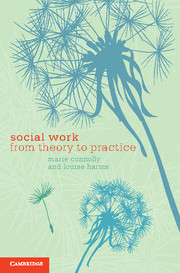Book contents
- Frontmatter
- Contents
- List of figures
- Preface
- Acknowledgements
- 1 Social work knowledge, theory and practice
- 2 Frameworks, models and practice
- 3 Ecosystems theories
- 4 Onion-peeling theories
- 5 Faulty-engine theories
- 6 Story-Telling Theories
- 7 Mountain-moving theories
- 8 Reflective practice and theory
- Concluding thoughts
- References
- Index
Concluding thoughts
- Frontmatter
- Contents
- List of figures
- Preface
- Acknowledgements
- 1 Social work knowledge, theory and practice
- 2 Frameworks, models and practice
- 3 Ecosystems theories
- 4 Onion-peeling theories
- 5 Faulty-engine theories
- 6 Story-Telling Theories
- 7 Mountain-moving theories
- 8 Reflective practice and theory
- Concluding thoughts
- References
- Index
Summary
IN MORE THAN A HUNDRED YEARS of social work our profession has sought to establish itself through the development of a knowledge base for practice. Indeed, during the 1970s professional credibility rested upon having a unified theory, something that proved elusive for social work as we strove to respond to the diversity of human need. High hopes were held for systems theory, but although its micro and macro elements made sense to social workers as a theory, it was never quite strong enough – or unified enough – to meet either our own disciplinary expectations or those imposed upon us. In our second century of practice we think that social work has the experience and confidence to recognize that we do not need to adopt a single theory for practice; indeed to do so unnecessarily limits our disciplinary creativity and capacity to develop more nuanced approaches. Rather, we can integrate theoretical perspectives in ways that respond to deeply held disciplinary values and strengths.
- Type
- Chapter
- Information
- Social WorkFrom Theory to Practice, pp. 177 - 178Publisher: Cambridge University PressPrint publication year: 2011



